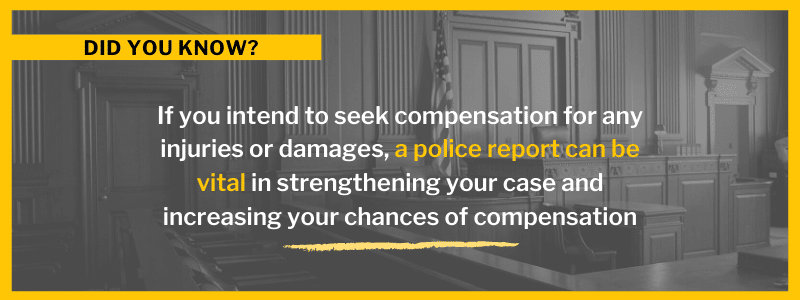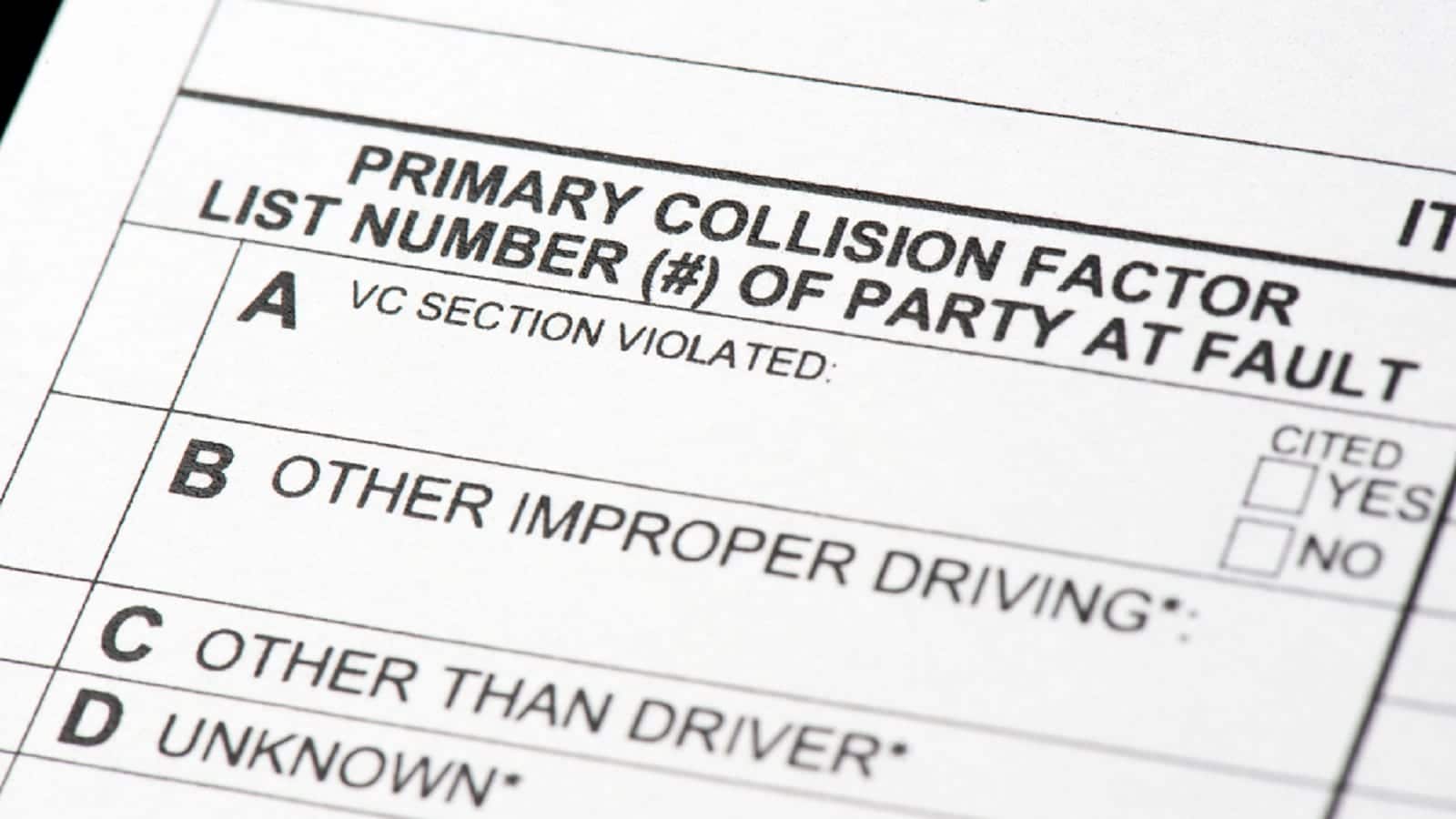 Oftentimes, when people are involved in minor accidents, such as a fender-bender, they believe it’s not necessary to file a police report. But if you intend to seek compensation for any injuries or damages, a police report can be vital in strengthening your case and increasing your chances of compensation.
Oftentimes, when people are involved in minor accidents, such as a fender-bender, they believe it’s not necessary to file a police report. But if you intend to seek compensation for any injuries or damages, a police report can be vital in strengthening your case and increasing your chances of compensation.
If you’re involved in an accident with no police report, it’s still possible to make an insurance claim, but it may be more challenging to substantiate your claim without official documentation.
Can you file an insurance claim without a police report? Well, it often depends on the insurance company’s policies and the specifics of your case, so it’s advisable to consult with legal experts or your insurance provider for guidance.
Even in cases of accident with no police report, our experienced team can assist you in pursuing an insurance claim and navigating the complexities of your case. Our Lafayette accident lawyers at The Law Offices of Blaine Barrilleaux have the knowledge and skills you need to build a strong injury case.
Our team of car accident attorneys is prepared to help you file an injury claim.
What Information Does a Police Report Include?
A police report is an unbiased, third-party opinion that states the details of the overall incident.
The report can be used as evidence in a settlement claim and alleviate the biased opinions of the drivers involved. Police reports include the following information:
- The location of the accident
- The date and time
- Injuries sustained by drivers and others involved in the collision
- Damages to the car or cars
- Witness statements
- Driver statements
In cases of accident with no police report, it can be more challenging to gather this crucial information needed for an insurance claim.
Can you make insurance claim without police report? While it’s possible to make an insurance claim without a police report, the lack of official documentation may affect the process and the strength of your claim.
Filing a Police Report
If you’re uncertain about how to file a police report, consider these steps after an accident:
- Call the police.
- Discuss the details of the accident with the officer.
- Make sure to obtain a copy of the report.
An important question is, can you file an insurance claim without a police report? In that scenario, it’s advisable to seek legal advice to understand your options and ensure you have sufficient evidence to support your claim.
What is an Insurance Claim?
An insurance claim is used to seek compensation from an insurance company for the damages or injuries you sustained in an automobile accident. Compensation could help cover medical bills, pain and suffering, mental anguish, lost wages, and other damages. The insurance company will evaluate your claim and calculate what they believe you’re entitled to. In some cases, accident victims are offered lower amounts than they deserve, which is why it’s essential to have legal representation from one of our Lafayette accident lawyers by your side.
Some important questions that need to be answered are, do you need police report to file insurance claim? The requirement for a police report may vary depending on the insurance company and the specific circumstances of the accident.
Do you need police report for car insurance claim? While it’s not always mandatory, having a police report can strengthen your claim by providing official documentation of the incident.
Can you file claim without police report? It is possible, but the absence of a police report may make it more challenging to substantiate your claim and negotiate for full compensation. Seeking advice from experienced legal professionals can help clarify your options and maximize your chances of a successful claim.
Common Injuries After a Motor Vehicle Accident
After an accident, it’s not uncommon to suffer injuries. Although injuries will vary depending on the severity of the accident, injuries can include:
- Scrapes and cuts
- Whiplash
- Chest injuries such as a fractured sternum, a punctured lung, or bruised ribs
- Broken leg, knee bursitis, torn meniscus, or broken ankle
- Traumatic brain injuries (TBI), diffuse axonal injuries, contusion, concussion, or coup-contrecoup injuries
What if I’m at Fault?
If the auto accident was your fault, it’s equally important to have a police report filed in order to document exactly what happened. Even if the facts aren’t in your favor, it is best to have an accurate account instead of relying solely on the statements of those involved.
In some cases, people try to fake accidents and injuries. A police report can help prevent the other party from making false accusations and claiming injuries or damages that never occurred.
An important question is, do you need police report to file insurance claim? Yes, having a police report can provide crucial documentation for your insurance company when processing your claim, especially if you are at fault.
Can you make a claim without a police report? While it’s possible, the presence of a police report can significantly strengthen your claim and provide an objective account of the incident.
Do I need police report for insurance claim? It’s highly recommended to have a police report as it helps in accurately detailing the accident for your insurance company’s reference, regardless of fault.
Also, a police report is important to have for your insurance company’s reference. They will want to know the details of the accident.
Can I File an Injury Claim if I Was a Passenger?
As a passenger in a car wreck, you can file a claim against the driver of the car, the other driver who may have caused the crash, or both drivers if they shared fault for the accident.
In such a scenario it is a valid question to ask, do you need a police report for an insurance claim? Well, the necessity of a police report may vary depending on the circumstances and policies of the insurance company involved.
Sometimes people hesitate to file a claim when it’s a friend or family member’s fault, but one thing to remember is that their insurance company will be the one you’re filing against for compensation.
Residential Resources
Listed below are community resources that can assist you after an injury:
- Police Department
- Lafayette General Health
- Women’s & Children’s Hospital
- University Hospital & Clinics
Louisiana Car Insurance Requirements

State law requires all drivers to have liability coverage. Liability insurance covers injuries that you may have caused as a result of a car wreck according to the amount of coverage you have in your insurance policy. The Department of Transportation (DMV) shares these certain requirements:
The minimum liability coverage limits required are:
- $15,000 of bodily injury coverage per person
- $30,000 of bodily injury coverage per accident
- $25,000 of property damage coverage
Also, you must have liability insurance in order to register your car or renew your registration. You must provide proof of insurance if you:
- Register a car bought from a private individual.
- Go to a DMV office to renew your registration.
- Transfer an out of state title.
Residents are able to select higher coverage limits for more protection, but listed above are the minimum requirements. For more information about insurance, vehicle registration, and what you must provide for proof of insurance, visit DMV.org.
Trusted. Knowledgeable. Experienced.

At The Law Offices of Blaine Barrilleaux, our Lafayette accident lawyers are devoted to helping victims who have been injured in an automobile accident. We understand how scary and overwhelming the moments immediately following an accident can be.
Our Lafayette accident lawyers can help you with the claims process and will strive to obtain the compensation you rightfully deserve for your injuries.
If you or a loved one has been injured in a wreck due to someone else’s careless actions, call our office today at 337-989-1212 or fill out our free case evaluation form. Our law firm is ready to fight for you.










